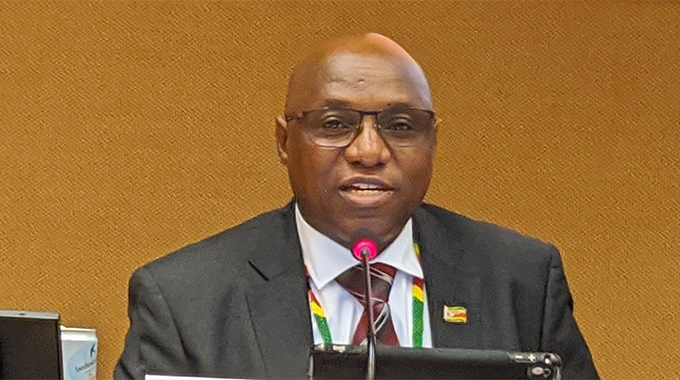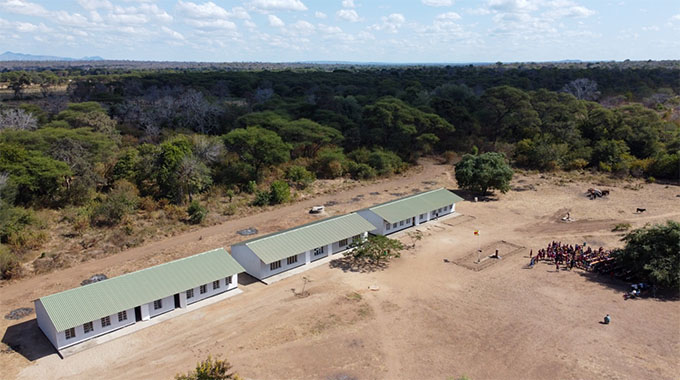@Jamwanda2 on Saturday: When all friendship ceases!

Von Hornick’s nine principles on National Economy
In 1684, an Austrian lawyer-turned-civil servant, Philipp Wilhelm von Hornick, published nine principal rules of a National Economy.
The 17th century was the age of mercantilism, which is how his treatise became the manifesto for mercantilist Europe.
The anvil of Europe’s mercantilism were States that would later become Austria-Hungary and, much later, Germany. Scholars of Germanic stock were great thinkers of that age and even beyond.
Hegel, Karl Marx and Frederick Engels were latter-day thought-giants hewn from that great scholastic tradition.
Still running on 17th Century principles
Going through the nine principles — not many Zimbabweans have seen or read them — one is struck by their timeless relevance, including to the contemporary economic age.
In a way this shows even our digital age very much runs on mercantilist principles.
This is why history matters. Economists may continue to invent new, sonorous terms, but the core principles remain the same, and 17th century ones.
It is worth my readers’ while to go over the nine principles so we all appreciate how the world remains the same, however much it pretends to have changed, or continue to change. Here we go!
Know what your land is worth!
The first principle which von Hornick laid down, called for a thorough investigation of what resources — above and below — a country holds.
To that von Hornick exhorted his countrymen and women “to inspect the country’s soil with the greatest care, and not to leave the agricultural possibilities or a single corner or clod of earth unconsidered.”
He added, “Every useful form of plant under the sun should be experimented with, to see whether it is adapted to the country, for the distance or nearness of the sun is not all that counts.
Above all, no trouble or expense should be spared to discover gold and silver.” This is in the 17th Century!
A botanist, geologist and naval expert
As I read through this first principle, my mind raced to a rarely published letter which David Livingstone wrote to his Cambridge Professor, one Professor Sedgwick, on the eve of his exploration missions to this part of our Continent.
Spelling out the mercantilist or commercial objectives at the core of his so-called missionary itinerary — forget about his lofty civilisation and proselytisation claims! — he confided to his professor his enterprise was colonial, and had taken along with him a botanist, a geologist and a naval expert!
It does not take much interrogation to know that Livingstone saw his mission as laying groundwork for the colonial acquisition of Land and Minerals for Great Britain, all through Conquest.
As with von Hornick, agriculture and mining mattered to national economies.
They still do, to this day, across climes. One hopes ZIMSAT 1 enables us to technologically consider every “single corner or clod” of our Earth as Zimbabwe.
Inventing beneficiation in the 17th Century
Von Hornick’s second principle straightforwardly declared that, “all commodities found in a country, which cannot be used in their natural state, should be worked up within the country…”
He percipiently added: “…the payment for manufacturing generally exceeds the value of the raw materials by two, three, ten, twenty, and even a hundred fold, and the neglect of all this is an abomination to prudent managers.”
The accent is on home-domiciled, or domesticated value addition and beneficiation processes of all raw materials at the disposal of a country and a people.
In short, industrialisation is on the strength of local factor endowments.
Does this ring a bell in present-day Zimbabwe, a good 500 years later?
Or on our planet where war, disease and nationalism have conspired to disrupt and even break supply global chains?
Critical demographic and skills mass
Von Hornick’s third principle built on the preceding two; it stated that citizens should be prepared enough to produce and cultivate those raw materials, and “for working them up”.
This third principle included building a demographic critical mass for a country, and ensuring citizens “should be turned by all means from idleness to remunerative professions; instructed and encouraged in all kinds of inventions, arts and trades; and, if necessary, instructors should be brought in from foreign countries for this.”
Then, the scare theory of Malthus was unknown.
Malthus, with his fear of human growth against diminishing food supply, would only come a century later.
Even then he forgot the role of science and technology as food production multipliers!
Harnessing the demographic dividend
I reproduce this amidst the just-ended elections in Nigeria, itself Africa’s most populous country.
Also at a time when China’s angst relates to its declining population, and the risk of it being overtaken by India demographically.
All these three countries flaunt their huge numbers to get a demographic dividend.
Their numbers have created an internal market for their manufactures, and have given them leverage in their encounter with other nations seeking to access their huge markets.
Zimbabwe’s small demography denies us both.
We must bent and double down, literally, and learn to multiply; there is virtue in numbers!
Zimbabwe’s skills plan
Above all, I reproduce this principle at a time when Zimbabwe, my own country, is hell-bent on an expanded manpower development programme, which seeks to horn skills in science and technology, and to encourage adoption of science and innovation in the Economy.
We have created Innovation Hubs at tertiary institutions. Barely a week ago, the President of this country wrote in anticipation of skills gain he sees coming back into the country through the repatriation of the more than 178 000 Zimbabweans from South Africa!
Prudence over gold and silver
It was von Hornick’s fourth principle I found staggering: “gold and silver once in the country, whether from its own mines or obtained by industry from foreign countries, are under no circumstances to be taken out for any purpose, so far as possible, or allowed to be buried in chests or coffers, but must always remain in circulation; nor should much be permitted in uses where they are at once destroyed and cannot be utilised again.”
He added that a nation exercising such prudence over its gold and silver, would never “ever sink into poverty; indeed, it is impossible that it should not continually increase in wealth and property.”
This was said in the 17th Century, ladies and gentlemen!
So much gold from our soil, so little in our vaults
Reading this principle, my mind adverted to a table published by the legendary Ghanaian editor, Baffour Ankomah, in the latest issue of The Third Eye magazine, of which he is Editor-in-Chief.
The table reproduces countries with the largest gold reserves in the world. Expectedly, the USA leads with over 8 133 tonnes; it is followed by Germany with 3 355 tonnes; then Italy (2 400 tonnes), France (2 400 tonnes), Russia (2 200 tonnes), China (1 900 tonnes) and Switzerland (1 040 tonnes).
The rest of western countries, including the United Kingdom which exploited our gold reserves for over a century, hold in their vaults less than four digits in gold reserves.
The only African country in the world’s top 30 is Algeria; it holds a mere 176 tonnes.
Yet the African continent has the largest gold reserves and current extractions.
Tellingly, South Africa, with a mere 125 tonnes, ranks 31, while Ghana, which is called “the Gold Coast”, is number 69, with its paltry 8,74 tonnes! Ghana’s annual gold production exceeds 100 tonnes!
Zimbabwe, itself a notable gold producer — we now do more than 40 tonnes a year — is nowhere in sight. In fact, Malawi is better than us; it is number 99, and holds 0.40 of a tonne in reserves!
Africa, it seems, never read von Hornick!
It probably will not read him, ever!
Mending past wrongs
The second thought which came to mind is the new royalties policy through which Zimbabwe now seeks to accumulate gold reserves!
After four decades of illiteracy, Zimbabwe is finally reading von Hornick, even then partially! My mind also raced to gold coins, which Zimbabwe now mints for sale, and which for the first time in history, facilitates gold circulation.
But unlike von Hornick, we do not mind guaranteeing that our minted gold coins leave the country for other jurisdictions, all in the name of free market principles we least grasp, least understand!
Even with such a porous policy, the IMF is not impressed; it thinks minting gold into coins for circulation and investment is a bad idea that must be stopped forthwith.
Zimbabwe defiantly thinks otherwise, and will not be persuaded!
That lifts my heart, somewhat.
This love for things foreign…
Von Hornick’s fifth principle can only be read by us, with unmitigated guilt. It reads: “… the inhabitants of the country should make every effort to get along with their domestic products, to confine their luxury to these [domestic products] alone, and to do without foreign products as far as possible (except where great need leaves no alternative….).”
Until recently, this mercantile principle would have convicted us en masse!
We are notorious for, in the words of late Tanzanian scholar, A M Babu consuming what we do not produce, and producing what we do not consume!
Zimbabwe’s supermarkets used to be awash with imported goods, mostly luxurious ones which bespoke of our jaded exotic tastes!
Our books never balanced as a result, thanks to our unchained tongues!
Now the situation is changing, thanks to the new policy of domestic value chains and import substitution.
Import raw materials only
Yet Von Hornick does not discount needful imports.
Except he lays down a caveat for them, through his sixth principle.
He says: where such purchases are unavoidable, “they should be obtained from these foreigners at first hand, so far as possible, and not for gold or silver, but in exchange for other domestic wares.”
His seventh principle goes even further: “…such foreign commodities should in this case be imported in unfinished form, and worked up within the country, thus earning the wages of manufacture there.” Principles six and seven speak to import efficiencies, which cut out middlemen/women. Zimbabwe’s procurement policy has been notoriously inefficiently, corrupt in fact.
That is now ending, with latest emphasis on “value for money”!
Except this was invented by von Hornick in the 17th Century!
Principle seven encouraged importation of raw materials for domestic transformation, and in exchange for local manufactures.
We do neither here in Africa, a net exporter of raw materials, and a net importer of finished goods.
We are Africans: we stand von Hornick on his head!
What Africa never learns
All that explains why Africa has, for centuries, been a net exporter of primary commodities to clever, mercantile Europe, without herself acquiring the technology for, and value that comes with transformation of raw materials into finished goods for global trade.
The recent ban on unprocessed mineral ores, and Zimbabwe’s insistence that foreign companies must produce mineral beneficiation plans, comes to mind. We have been exporting value and jobs, thanks to our ignorance of a commonsensical principle laid down far back in 17th Century by mercantile Europe, which continues to benefit from this strange inversion of a principle it invented to our collective detriment!
This is how far backward we have been and, save for Zimbabwe, Africa remains.
Lesser world as your supermarket!
The eighth principle exhorts a country to seek “day and night” opportunities “for selling the country’s superfluous goods to these foreigners in manufactured form, so far as this is necessary, and for gold and silver. . .”
It is a principle on export-led growth, all paid for using non-renewable precious minerals. Von Hornick adds: “… to this end, consumption, so to speak, must be sought in the farthest ends of the earth, and developed in every possible way.”
For Hornick, the rest of lesser mankind must become a consumer market for mercantile Europe.
One understands why the British went to war in Hong Kong, to force China and the Chinese to buy and smoke opium, all to balance trade.
Then China beat England in manufactures, itself enough cause for war in the 19th Century! Do we understand and learn from history?
Story of Knight-Bruce and Mutekedza
After the colonisation of Africa and the rest, the same British created the Empire Marketing Board which cultivated native tastes for British goods in Africa, India and elsewhere.
One Anglican missionary, Father Knight-Bruce, traversed Mutekedza’s area in the late 1870s.
Faced with exquisite iron manufactures by local blacksmiths, he entered this in his diary: the products they produce are far superior than what is produced in all our foundries in Manchester; all this local capacity and ingenuity has to be suppressed if the “mother Country” is to secure markets here! Indeed, after colonisation of Zimbabwe, local foundries were systematically attacked and destroyed, to create a market for British wares. Do we know this?
The Indian “swadeshi” movement
Or have we heard about the “swadeshi movement” in Indian nationalism?
I bet not! Alongside Sudan and Mexico in South America, India had long invented cotton and ginning well before colonisation, and while Europeans still dressed in animal furs.
Upon discovering this wondrous crop in India, South America and Africa, British and other European shippers plied the high seas to secure and control this “new white gold”.
The story of sea piracy and sea-warfare has its origins in securing shiploads of cotton destined for Europe.
Check that out, if you think Jamwanda exaggerates! As cotton ginning took hold in major British towns, the Indian hand looms were outgunned and deliberately suppressed to create a market for British garments! The small Indian cottage cloth manufacturers lost ground to cotton barons based in Manchester and Liverpool. Expectedly, India’s fight against the British Raj took the liberating form of rejecting British manufactures, ahead of India’s Independence in 1947!
Blind-spot of African nationalism
That movement, the Swadesh, and born in 1905, took the form of boycotting English manufactures, principally cloth manufactured in Manchester, and salt purified in Liverpool, in favour of local Indian substitutes.
Through such an organised boycott, Indian nationalists were able to get their masses to understand that the West’s colonial imperialism took the form of turning the colonised into suppliers of raw materials, while simultaneously being turned into captured consumers of finished goods from so-called “mother countries”.
This was the main pitfall of African nationalist movements; they never grasped this mercantile dimension to colonial imperialism, and thus could not integrate appropriate responses of resistance, including at the marketplace, in the whole decolonisation process.
This is why our struggles against foreign domination lacked depth, and thus excluded economic nationalism.
Thankfully not so here in Zimbabwe!
When all friendship ceases…
What is von Hornick’s ninth and final principal? It deserves to be quoted in its entirety: “…except for important considerations, no importation should be allowed under any circumstances of commodities of which there is sufficient supply of suitable quality at home; and in this matter neither sympathy nor compassion should be shown foreigners, be they friends, kinsfolk, allies, or enemies. For all friendship ceases, when it involves my own weakness and ruin.
And this holds good, even if the domestic commodities are of poorer quality, or even higher priced.
For it would be better to pay for an article two dollars which remain in the country than only one which goes out, however strange this may seem to be ill-informed.”
So many questions for Zimbabwe, Africa!
Gentle reader, I invite you to weigh the aforesaid nine principles in relation to how we have handled our affairs, firstly as free Zimbabwe, and secondly as free, decolonised Africa.
Have we read Philipp W. von Hornick, a good 500 years later? Are we aware that the whole global order and edifice remains seated on the ramparts and foundation of principles of mercantilism?
That we go nowhere until we know what our earth grows; what each “single corner or clod” of our Earth contains?
That we must prudentially manage our gold and silver, using and deploying both is such a man value is neither destroyed nor lost to other nations?
That we must never sell our raw materials, but instead turn them into finished goods through native ingenuity, before selling to the rest of the world?
That we should always eat what we produce, shunning foreign luxuries and trinkets which sap our national stock and wealth?
That we must learn to love and buy Zimbabwe, no matter what?
For its far better to pay “two dollars which remain in the country than only one which goes out, however strange this may seem to be ill-informed”?
Good Samaritan, bad Economist!
Above all, do we, as Zimbabweans know that in the marketplace and where national interest or gain is concerned, “all friendship ceases, when [this] involves [Zimbabwe’s] own weakness and ruin”?
That where such is involved, “neither sympathy nor compassion should be shown foreigners, be they friends, kinsfolk, allies, or enemies”?
Or in the words of Charles Dickens, that “the Good Samaritan was in fact a bad Economist?”
He put compassion ahead of opportunity, and thus lost the Economy made out of crime and distress!
We donkeys know that Americans know and practice this better than any in the world.
This is why their industrial-military complex makes or looks for wars!







Comments